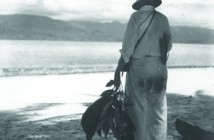THE ROLE OF MOTHER NATURE IN WINE MAKING
Several days before my most recent wine trip, my boss said to me: “When you get there, make sure you steal a grape directly from a vine.” A few glasses of wine after arriving in Napa Valley, I shared this remark with my friend, who laughed hysterically and said, “Only one grape? Rip off the entire cluster!” I paused and thought to myself, “Well… I am an overachiever after all.” Feeling tipsy and adventurous, I gave into the uncontrollable peer pressure, snuck over to a grapevine, twisted off a bundle of juicy-ripe grapes, and ran to the rental car in my four-inch wedges yelling “Go! Go!” I immediately consulted via text message with my sister, Ms. Attorney-At-Law, who said I could be charged with “one count of burglary of a cluster and one count of stupidity,” neither of which have any real criminal sentencing, but we ate the evidence just in case.
Regrettably for wineries, humans are not the only ones who decrease a vineyard’s crops. Wineries lose a significant number of grapes to Mother Nature, including climate variation, disease, creepy-crawly insects, and larger pests. Winemakers employ a number of systems to protect their gorgeous acreage and are constantly in pursuit of more efficient methods. In the past thirty years, wineries have gradually reduced the use of insecticides and rodent poisons, and, instead, moved toward the use of animal predators to control grape-eating critters.
Many wineries have installed nesting boxes and twenty-foot high bird perch poles throughout the vineyards to attract hawks and owls. These birds prey on rodents such as gophers and moles that rummage through the property eating vine roots, which can severely damage and even kill grapevines. The owls and hawks in the valley have to migrate naturally to these nesting houses, but once the birds find them, they officially move in. The hawks hunt during the day, while the nocturnal owls take the night shift, providing a round-the-clock rodent watch squad. This has enabled wineries like Shafer Vineyards to eliminate completely the use of poison in the soil to control the rodent population. Shafer was so proud of this effective ‘survival of the fittest’ technique that it named its Chardonnay “Red Shoulder Ranch” in honor of the Red Shouldered Hawks scavenging the grounds. A high-rise view, free unprocessed food, and a delicious wine labeled after you… I want to be a hawk in my next life!
The sparkling wine producer, Mumm Napa, employs a similar technique for insect control through the use of bat colony boxes. Insectivorous bats can feed up to a third of their body weight each night, which can amount to 3,000 insects that would otherwise prey upon leaves and grapes in the vineyard. Bats have always played a key role in controlling insect populations worldwide, and wine countries from California to France are benefitting from this inexpensive, eco-friendly method. Wineries also control insect problems by planting “cover crops,” which are vegetation that attracts predatory insects such as ladybugs, lacewings, and spiders to prey upon vine-damaging insects like beetles, leafhoppers, mites, caterpillars, and white flies.
Protecting the vineyard is not the only role Mother Nature plays in winemaking; some animals actually help clean the terrain. Every year in the off-season, Artesa Winery in Napa Valley spreads sheep amongst the vines to graze the fields and fertilize the soil. In just a few days the fields are naturally cleaned and nourished for the approaching grape-growing season.
Whether hunting or grazing, the animal kingdom has become an integral component to sustainable viticulture. Wineries have benefitted from the prudent use of wildlife to cultivate their land and produce delicious wine. The role of Mother Nature in winemaking continues to grow, giving these wineries an authentic, organic energy.
_________________________________________
Daniele Rosenfeld has a Master’s in Business (MBA) and a Bachelor’s in Hospitality Management. She joined the beverage industry in 2006 with Southern Wine & Spirits and went on to lead the promotional marketing division in Miami. She has been a contributing writer for SOMI Magazine since 2010, covering dining, nightlife, and wine.



